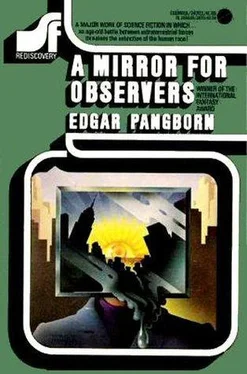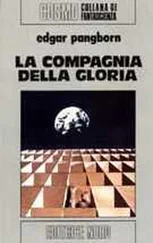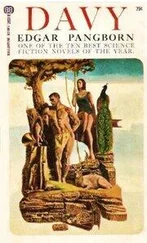Still the seed lives, and the flowering of individual selves can be glorious even in the niggardly threescore and ten.
I admitted more. Sharon as a person had reached me somehow, touched me in almost the way that Angelo had done. She lacks his precocity, she may lack his blazing intellectual curiosity. But you put me on my own, Drozma. Observer Kajna did not learn of Sharon. If she had…?
From my window I saw Angelo and his mother go down Martin Street before nine o’clock, nicely dressed, to Mass. Rosa was walking with weariness, Angelo too spindling-small to help her much. I went out too, and strolled down Calumet Street the other way. The morning was muggy, sun pressing through windless haze, a tropical day, a day for the lazy, a day to make me remember the palms of Rio or a warm ocean dreaming against the beaches of Luzon, where I lived once — but that was a long time ago.
I heard trouble before I reached EL CAT SEN: Sharon’s voice, cold, tight, and terrified, from the recessed entrance of a boarded-up house next door to the shop. “Don’t, Billy! I’ll never say it — don’t!”
I hurried, but my steps must have made noise. Nothing seemed to be happening when I arrived. Sharon was leaning stiffly against the nailed-up door, almost hidden from me by a big-shouldered boy who drew away from her as I appeared. Her right hand was behind her. I had an impression the boy had just released it, and he turned a blond head to stare at me. Much taller than Sharon, thirteen or fourteen and blocky, handsome but blankly so as if he were already expert at wearing a mask. Well, human beings are sometimes good at that. Sharon grinned feebly at me. “Hello, Mr. Miles!” The boy shrugged and moved away.
I said: “Come back here!” He only turned to stare again, hands in his pockets. “Were you bothering this girl?”
“Nope.” He was unalarmed, unashamed. His voice was adult, no adolescent croak. He might have been older than he seemed.
“Was he, Sharon?”
Barely audible, Sharon said: “Nuh-nuh-no.” She had a red rubber ball on an elastic string, and bounced it thoughtfully. I noticed she used her left hand for that. “Sharon, may I see your other hand?”
Reluctantly she held it out. I saw nothing wrong with it. When I looked up the boy was gone, around the corner. Sharon poked at a wet eyelid with annoyance. She said in a manner too ornate for the Court of St. James’s: “Mr. Miles, how can I ever adequately thank you?”
“Think nothing of it. Who’s the yellow-haired phenomenon?”
That helped. She nodded in acknowledgment of a valuable word. “Just Billy Kell. He is, heck, indeed a phenomenon.”
“’Fraid I don’t like him. What did he want?”
Her mouth went tight. “Nothing.” She bounced the ball with desperate concentration. “He’s a mere phenomenon, think nothing of it.” In need of small talk, she added politely: “I hear you had a burglary.”
“Yeah. News does get around.”
“Heck, I stopped by your house this morning before Angelo had to dress up for church. He says Dogberry will never abdiquately get to the bottom of it, and so phoo on Dogberry, don’t you think so? By the way, do you swear never to tell if I happen to show you something?”
I said swearing was a serious matter; but she knew that. She studied me a nerve-twisting while, and made up her mind. She peered up and down the street, and darted down to the basement areaway. The lower entrance was half hidden under the front steps, only one board nailed to its wooden door. “You have to swear, Mr. Miles.”
I examined conscience. “I swear never to tell.”
“You have to cross your heart if it’s going to be legal.”
I did that, and she lifted away the loose board with slight effort, using her left hand. But she was not left-handed: I notice such things. I followed, closing the door behind us as she ordered, and we were in a hot dingy gloom, musty and vague, with a smell of rats and old damp plaster. I assured her I could see my way, but she gripped my thumb to guide me through a wilderness of empty crates and nameless litter, to a back room that had been a kitchen before the house was abandoned. There are too many such houses in Latimer, and the drift of population to the countryside may not be quite enough to explain it. I wonder sometimes if human beings have begun, a little, to hate the cities to which they have given such effort.
A large flimsy structure loomed in this kitchen, something knocked together from old crates, a house within a house. Sharon said: “Wait.” She ducked into the contraption and struck a match. Two candles glowed. “You can come in now.” As I squeezed in, she was hushed and solemn, the sea-blue of her eyes lost in enormous black. “Nobody ever did before, except me…. This is Amagoya.” With obvious second thoughts and fear that I might not deserve the trust, she said: “Of course it’s unequibblical make-believe.”
It was and it wasn’t. There was an altar here, the upturned bottom of a box. On a makeshift shelf above it was what some might have taken for a rag doll. “Amag,” Sharon said, nodding to him. “Just merely a representation, used to be a doll. Dolls are so childish, don’t you think so?”
“Maybe, but make-believe is real. The inside of your head is real. Things outside are a different kind of real, that’s all.” The objects on the box-altar were flanked by the candles. A boy’s cap, frayed at the brim, a penknife, a silver dollar. “Am I really the only one to see this, Sharon? Not even Angelo?”
“Oh no!” She was shocked. “Amagoya is me when I’m alone. And now you, is why I had to make you swear. Well, because you don’t laugh only at the right times.” A pity, Drozma, that I had to live 346 years before receiving a compliment of such magnitude. “The dollar, He got that for a school prize and gave it to me for a luck piece. The penknife because I wanted one and He said keep it.” You could hear her capitalize the pronoun. “The cap He just threw away.” There was no room for polite comment even from a Martian, and Sharon wanted no comment. I looked respectful and that was sufficient. She changed the subject with relief, saying apropos of nothing and with a gusty sigh: “Pop came home drunk from lodge meeting. I veritably couldn’t sleep, with them fighting. He hit the lid lifter against the stove just to make a noise, busted it to hell square off, frankly you wouldn’t believe the things I put up with, frankly…”
“Look, Sharon — that Billy Kell. I think he did hurt your hand. You could tell me about it.”
“I couldn’t permit you to beat him up. Frankly I couldn’t take the responsibility.”
“I don’t beat people up, but I might scare him a little.”
“He don’t scare, anyway I’m not afraid of him. He didn’t really push my finger back, just pretended he would.” She had no real resources of deception; I took advantage of that, by simply waiting. “Well, he was trying to make me say — something I wouldn’t, was all. About me and Angelo. Billy can go drown. He is a mere phenomenon, Mr. Miles….”
“And the finger?”
“Honest, it’s all right. Look, this is how you play a scale.” She demonstrated, on the floor. I saw, not only that her hand was unharmed, but that her thumb already knew how to pass under the fingers in clean precision. After only one lesson. Slow, of course, but right. You yourself, Drozma, have spoken kindly of my ability as a pianist. But I know that we can never equal the best human players, and not merely because our artificial fifth fingers are dull. Do you think it might be because human beings live only a little time, and remember this in their music?
“I’m puzzled, Sharon. This morning Angelo said something about Billy Kell. As if they were friends, or so I thought.”
Читать дальше












